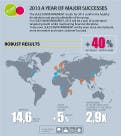New Services & Australian Desalination Plant Key as Suez Environment Posts Profit
Following the publication of its 2013 financial results, Suez Environnment’s CFO has told WWi that the company is rapidly expanding in Asia and sees significant room for growth in desalination for both municipal and industrial customers.
The latest annual figures from the company showed that while profit has risen, revenues fell by 3% to €14,644 million for the year, primarily due to currency fluctuations and weaker market prices for secondary raw materials.
However, Earnings Before Interest, Taxes, Depreciation and Amortisation (EBTDA) showed a gross increase of 2.9% to reach €2,520 million for the year. The company largely attributed this to the growth of its International division.
The Water Europe division also contributed to growth with an organic EBITDA increase of +1.7% or €20 million, despite unfavourable climate conditions in France and Spain.
Growing expectations
Speaking to WWi, Jean-Marc Boursier, chief financial officer at Suez Environnment said that on the back of the year’s solid financial performance, which included a reduction in net financial debt of around €200 million, the company is very confident for 2014 and is targeting an organic growth in profitability of at least 2%.
In Europe, the company grew the overall revenue generated from its water business by 2% - or €86 million.
Further afield, Suez Environnement said that it is opening up new markets, as shown by the new water service contracts signed in India, industrial facility management contracts in Brazil and continued expansion in mainland China through the reinforcement of its partnerships.
The company’s international water business also benefited from the December 2012 completion of its 450,000 m3/day desalination facility in Melbourne, Australia - the largest such plant in the southern hemisphere.
Boursier said that following completion of the plant the company has now entered into a 37 year period of operation for the plant, which is now fully functioning.
In terms of the global desalination market, Boursier said that in addition to Australia, the Middle East and Chile represent growth opportunities, as do both India and China.
“If you take the example of China, they have 21% of the world’s population, but just 7% or 8% of the natural resources. They will have to face water capacity at some stage,” the CFO noted.
According to Boursier, a new development that the company is seeing in terms of desalination is its use in industrial applications.
“More and more we have been looking at projects for industrial partners of ours because they need to have their over specific resources so as not to generate a conflict of usage with population and agriculture,” he explained
This is a technology that we believe can grow by 10% to 15% per annum for at least the next 20 years,” continued Boursier.
The company said that its Water Europe division generated total revenues in 2013 of €4,437 million, which benefited from the momentum of new services that registered an 11% increase.
Boursier explained that due to increased Environnmental awareness, water usage in many of the company’s developed markets is reducing, but that it is still required to charge on a per cubic metre basis. As such, if the company does nothing, revenues will be affected.
To mitigate this, Suez Environnement has introduced a number of highly value-added services which are able to generate revenue that is not solely based on the volume of water used. One of the technologies that are enabling the company to do this is its smart water metering.
“We want to have direct access to the customer - whether that customer be an individual, a business or a local authority - invoicing high value added services which are not based on consumption only, such as insurance product” he continued.
The company cited the example of the City of Mulhouse in Eastern France, which has selected the Group’s remote metering offer as part of its ‘smart city’ project. Globally, Suez Environnement said that it has sold some 1.8 million smart water meters.
According to Boursier such new services are already generating revenues of around €350 million for Suez Environnement, with plenty of room for further expansion.
For more information on the company's markets and developments click on the infographic above.


